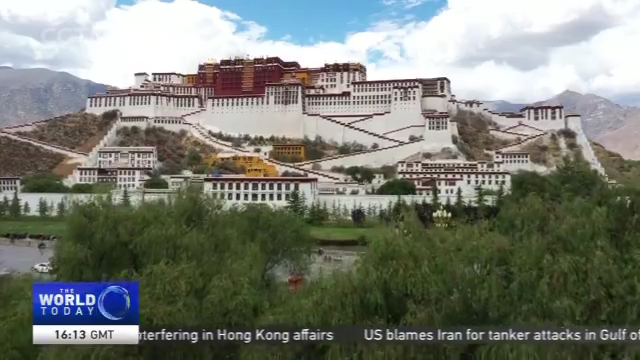
09:13, 15-Jun-2019
Tibet Opening Up: Forum on the Development of Tibet opens in Lhasa
Updated
21:53, 19-Jun-2019

This year's Forum on the Development of Tibet took place in Lhasa on Friday. Some 160 people from 37 countries and regions took part. CGTN's Meng Qingsheng reports.
Back in the 6th century, residents of southwest China's Sichuan and Yunnan provinces traded tea for horses with the people of Tibet, following a winding path through the mountains. The route is known as the Southern Silk Road, an integral part of modern-day China's Belt and Road Initiative. At this year's Forum on the Development of Tibet, participants discussed the region's significant role in preserving Silk Road civilizations.
ELIZABETH HELEN MCLEOD CEO OF MERIDIAN LINE FILMS "If you look back at the history of Tibet, it wasn't a cut-off remote part of the world. It was absolutely at the center of both commerce and knowledge exchange between south of the Himalayas and north of the Himalayas, and west of China and the east of China."
The Southern Silk Road goes beyond national boundaries. It is a symbol of strength for trade and cross-cultural relationships among Asian countries.
MENG QINGSHENG LHASA, TIBET "Tibet has been working towards building a closer connection between China and South Asian countries. It's a crucial part of an economic corridor linking China with Bangladesh, India and Myanmar. In 2018, the region unveiled about 15 hundred projects designed to invite external investment. It's part of a policy focusing on open development."
Over the years, Tibet has worked to open its central and frontier cities to the rest of South Asia. Rupak Sapkota -- a scholar from Nepal -- calls for interconnectivity in the region based on sustainable development and shared prosperity.
RUPAK SAPKOTA SECRETARY-GENERAL, NEPAL INSTITUTE FOR STRATEGIC STUDIES "China and South Asia have huge economic engagement, in trade also, in investment also, tourism also. We need to have physical connectivity that needs to be run for the whole year."
Participants also highlighted the role of opening-up policies in preserving Tibetan culture.
OCTAVIO RAMOS LAZCANO CONSULTANT, LOCAL GOVERNMENTS IN MEXICO "By opening Tibet to the world, you are ensuring that the richness that it represents not only transcends its borders, it also shows the survival and growth by disseminating a part of the Chinese culture to the world."
The one-day forum underscores the huge social and economic progress in Tibet since feudal serfdom was abolished in 1959. Experts believe, with better and further opening-up policies, a new phase of development will soon be on the horizon. Meng Qingsheng, CGTN, Lhasa, Tibet Autonomous Region.
SITEMAP
Copyright © 2018 CGTN. Beijing ICP prepared NO.16065310-3
Copyright © 2018 CGTN. Beijing ICP prepared NO.16065310-3